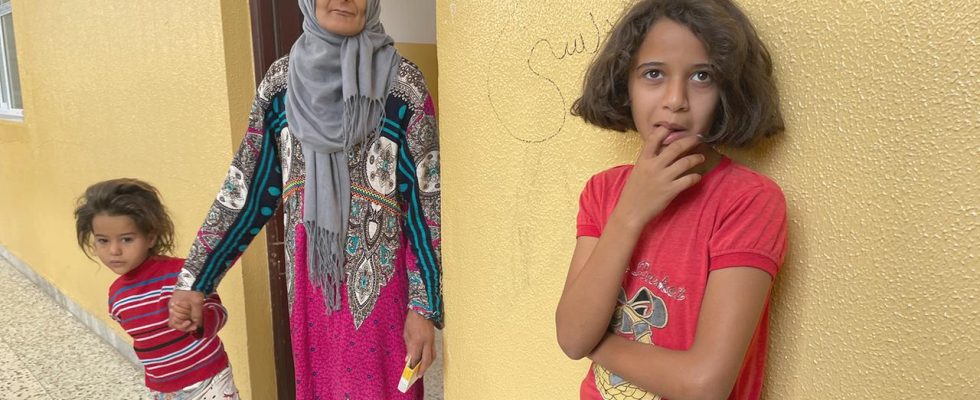report
They have lost relatives, their home and often also hope. In Libya, helpers are trying to give the children of the flood disaster some confidence again. And sometimes a child’s laughter returns.
Happy children’s laughter echoes across a suburb of Libya’s coastal city of Darna. Dozens of children run around a parking lot, holding hands and dancing. Next door, children are doing a relay race with colorful rings. A helper distributes sweets and is surrounded by the children. Darna hasn’t experienced this much joy in a long time.
The city used to be so beautiful, says nine-year-old Rafraan. “But now everything is different, now everything is destroyed,” she says. “I was afraid.”
The aim of the game campaign by volunteers from the Libyan Boy Scouts and the Red Crescent is to ensure that the children can laugh again, says helper Talal al-Aqrabi.
At the beginning they were worried about tackling the topic of trauma work. “But the reactions of the children and parents are very nice,” he says. “We see how the children play here and have fun. We motivate them.” The helpers would also go to the displaced people in the emergency shelters to create a different atmosphere for the children.
Experienced terrible things
Many of the children experienced terrible things during the disaster three weeks ago: the storm and rain became increasingly violent, and masses of water flowed through the city when the dam burst. Houses were simply torn away and many of the children lost their homes and relatives.
“A girl drew the dam that collapsed and flooded the valley,” says al-Aqrabi. “The topic still concerns the children a lot. That’s why we try to put them in a different atmosphere.”
Al-Baeda shelters
About an hour’s drive from Darna are some of the emergency shelters for people who have lost their homes to the floods in Darna and other cities. In the city of Al-Baida, schools were spontaneously converted into refugee homes – a family now lives in every classroom.
Like Iman. She crouches on a mattress in the corner of the 2A classroom. The single mother and her three children only narrowly escaped the floods in Darna. The petite woman begins to cry. She takes her little daughter in her arms. “The house just collapsed,” she remembers. “Neighbors helped us. We also get help here.”
Suddenly Iman collapses and faints. The stress, the memories were too much for her.
Helpers in Darna, Libya: Creating a good atmosphere for children
They have nothing left
Nawara, the neighbor, continues the story. They also had nothing left when the flood washed away their home – they managed to escape just in time. They sleep on mattresses that lie on the floor. Blankets and clothing were donated. They try to dry the laundry between the bars in front of the windows. You have lost everything – and have no idea what will happen next.
The children would scream at night. “The flood is coming, the flood is coming,” they would shout, says Nawara. She doesn’t need food or donations. “I just need one thing: a safe place to live,” she says. “We need a house. The children need a home. We can’t stay in school.”
Because classes will start again soon – and then the homeless families will have to leave. The women are desperate. “But where should we go? We have nothing left, where should we go?”
The anger is growing
Anger at the authorities and politicians is growing among people from Darna and the surrounding area. Many families are demanding government support – knowing full well that this is exactly what is lacking.
The country has been in chaos for years: After the fall of long-time ruler Muammar Gaddafi, there was a long-term war in Libya, rival militias fought each other – all diplomatic efforts to lead Libya to a unity government and democratic elections have so far failed. Two governments are fighting for power in the country. The result of the ongoing violence: massive neglect of the population. The economy has collapsed, the infrastructure has fallen into disrepair, and there is corruption. People feel forgotten.
Children in Libya: Many have lost their homes and loved ones.
distribution struggle around Reconstruction aid
Both political camps tried to exploit the crisis for their own benefit. Even if there were arrests after the dam breached, it is questionable whether this is more than just eyewashing.
The battle for distribution of reconstruction aid has already begun, says Claudia Gazzini from the Crisis Group. She was in Libya until recently. “What I see is that the rivalries between the authorities in the East and the West are already re-emerging when it comes to the distribution of reconstruction aid.”
“We see the back and forth about who should control the reconstruction and I find that so sad,” she says. “The catastrophe was only a few weeks ago. And we are already arguing about funds.”
“Darna is a city of ghosts”
A reconstruction that the people in the emergency shelter also urgently want. Not everyone wants to go back to Darna. “Darna is a city of ghosts,” says Iman when she awakens from her faint. “We’re afraid of Darna.”
A fear that perhaps only time can take away from them. And the children?
Back in the parking lot at Darna. Helpers laid out a large banner there. Darna’s children can use pencils to draw whatever is on their mind. A girl paints cars being washed away by water. Others kneel down and paint Darna as they remember the city. “Darna is beautiful,” writes a child next to it. The children of the catastrophe. At the latest, they want to rebuild their home and their city at some point.

